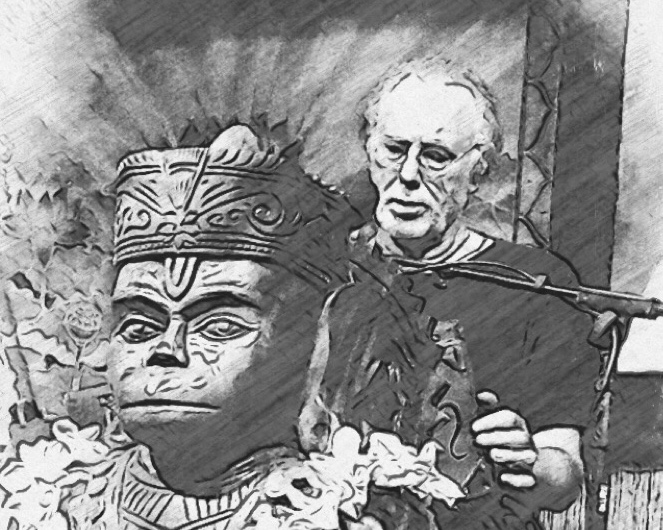
Podcast: Play in new window | Download
Subscribe: Apple Podcasts | Spotify | Amazon Music | Email | RSS
Call and Response Ep. 75 | Humility
Q: I just wanted to mention how 2019 was the year of practicing humbleness for me because it was how I understood love, how to get into somebody else’s shoes in order to understand where they’re coming from so that we can all be at peace. Can you speak about humbleness?
“Our inability to really do anything that’s for our own sake, that will be good for us, that would lead us to happiness, to openness, to being a good human being; our inability, so, the strength of God, of the Universe; it’s all from that place that all goodness comes. Of course, that place is within us.” – Krishna Das
KD: Yeah, hi.
Q: So, I have a hard time being in love and when you have, like, a neighbor that hates you or you hate them and trying to find that place of love
KD: You love hating that neighbor. It’s so wonderful, isn’t it?
Q: So, we play your music and the neighbor hates it.
KD: Ah, good. Excellent. Play it louder.
Q: We do. And so, we also have another neighbor that, her father passed away and she came over crying one day that, you know, “thank you for playing your music. So, it was totally contradictory to…”
KD: Well, put the speakers on that side of the lawn. So, you know, I have this friend who wrote to me and she said, you know, she’s breaking up with her husband and it’s so painful and she wishes it wasn’t happening. So, I said, “Well, what’s going on?” She said, “Well, you know, I love your chanting, so I play it in the kitchen. I play it in the living room. I play it in the bedroom upstairs. I play it in the guest room downstairs all the time.” I said, “Turn that music off and save your goddamned marriage.” So, put the speakers only so that one person can hear it. Leave that poor guy alone, you know?
Q: Well, with that in mind, I just wanted to mention how 2019 was the year of practicing humbleness for me because it was how I understood love, how to get into somebody else’s shoes in order to understand where they’re coming from so that we can all be at peace. Can you speak about humbleness?
KD: I don’t know, you know. I’m so humble, it’s hard to really talk about it. People say that to me all the time. “Oh, you’re so humble.” And I say, “Well, I know me.” But nobody gets it. They think I’m humble. It’s so weird. You know, real humility is the whole thing. Real humility is, you know, so I was in India and I was in a little town called Vrindavan and I was walking down the street and I stepped in a hole in the street and I snapped my leg, my knee, like this, and when I woke up in the morning my knee was like, swollen, like huge, right? So I figured I was going to have to go to the hospital. Now, Maharajji had forbidden us to come to the temple before four o’clock in the afternoon because the local Visa guy, Visa official, was harassing Him about the Westerners. It was politics. He just wanted some money, you know. And Maharajji wasn’t going to give it to Him so He was giving Him a hard time, so but I woke up in the morning with this knee and I thought, “I have to go to the hospital down in Mathura which is the town about 20 miles away, but before I go I should tell Maharajji I was going.” So, with great difficulty, I walked to the temple, leaning on a friend of mine, you know and I limped in, you know, like this and He was sitting all alone on, sitting on His cot, a tucket, they call it, in the middle of the courtyard, a completely empty big courtyard and He was right in the middle of it and there was one Indian guy sitting with Him. So, I kind of limped up, you know, and I pranamed and bowed and I sat down but I couldn’t bend my knee so I had to put my leg out straight underneath the tucket, you know? In India, you don’t really do that. You don’t point your feet towards your teacher. So, He didn’t say anything, right? He just looked at me and then after a few minutes, He gets up and He walks towards the back of the temple and the Indian guy got up and walked with Him because He walked like a two year old, bong, bong, bong, and the people would take His hand and walk with Him, you know? So, He was walking like this and the further away He got from where I was sitting, He started leaning on the guy and worse, like this, you know? And I, it looked like He could hardly walk and I thought, “He’s taking on the karma of my knee.” You know? The minute I had that thought, He turned around and He ran back to the tucket and He plops down, He looks at me and said, “You thought I was in pain? You wanted to help me?” And He pats me on the head. So, He didn’t say anything about, like, “Why did you come? Why? I told you to come at four o’clock.” So, I thought, you know, I’m just sitting here. I’m getting darshan. I’m hanging out with Him. I don’t care, if you can cut the leg off over here it’s fine with me. So, we sat around for a while and I kept thinking, “What’s the karma?” You know, I used to think about these things. Like, “What’s the karma of this knee? I wonder what I’ve done in the past to step in a hole in Vrindavan, such a sacred city. How could this happen?” All day long, yada yada yada. So, gradually, other people showed up and so, there was this woman sitting there, and she had a bible with her because he used to talk to us about Jesus. There’s this little guy in a temple, He would talk to us about Jesus. It was like, what is going on here? You know? It was quite interesting, but that’s another story, so anyway, so He grabs her bible, He opens it up and He points to this, just like this, “Read this.” So, I looked at it and I, it was from Saint Paul and it said, “In order to save me from the abundance of revelations, it was given to me a thorn in the side and I beseeched the Lord three times to take it from me and the Lord said, ‘My grace is sufficient for thee. My strength is made perfect in your weakness.’” So, Ram Das and I had t-shirts made up. I forget what, you know, like, right, we believe, because what that means, I’ve been thinking about this for 45 years and this is…
Our inability to really do anything that’s for our own sake, that will be good for us, that would lead us to happiness, to openness, to being a good human being; our inability, so, the strength of God, of the Universe; it’s all from that place that all goodness comes. Of course, that place is within us. It’s not out there up in the sky, standing around with a long beard and you know. That’s My strength. Capital “My”. That’s the strength of the Lord is within us, our true nature. And everything good that comes in our lives, everything we accomplish, every openness that comes, every compassionate thought, every helpful thought, every kind thought, it comes from that place. Once again, the ego will never do anything to diminish itself. It’s not what the ego does. It wants to live and it takes credit for all kinds of things but the Lord said, “My grace is sufficient, is enough for you.” You don’t need anything but this grace and your weakness, our inability to really do anything on the same level that our bullshit is, to help ourselves, that’s the proof of that. And the fact that we’re here is grace and it’s the grace pulling us into our self. Human beings experience being pulled within as longing. Yeah.
The t-shirt said, “Proof.”
Somebody’s blocking the flow. Somebody’s not feeling good…
So, the idea of grace, that’s a hard one for us, you know, we’re westerners, we don’t know what grace is. And even if we think about grace, we’re taught that grace comes from up in the sky somewhere, somewhere else, but grace is our natural state. It’s who we are. Underneath who we think we are, which is the whole, it’s where all the bullshit is, all the problems is who we think we are. Who we’ve been trained to believe we are by our life experiences, by our parents, by our school, by the students in the school, by the teachers, by the programs, by the place we happen to live, by the culture of that place. This formed us. This is the one lifetime manifestation or what’s the word, this is the karmas that we’re born into and that created who we think we are. But underneath that is the state of grace that we actually are. And once again, Maharajji said, “You can’t, the higher, more subtle states, the deeper states of awareness can’t be done by ‘me’. It’s only by removing the covering of that that that shines more brightly.” Our personal will, we can’t, “Ok, I’m going to go to that state of grace,” I, me, is never going there because me would dissolve in there and I don’t want to dissolve. Me is going to go anywhere else but there. But the longing in our hearts to be free of that me-ness, that prison of our thoughts. Every thought is a prison. Every thought is a prison and you can’t, you can’t think yourself out of a prison that’s made of thought. That’s personal “me” and the personal will, so but we do practice to release ourselves from that prison of thought, into the open space of our true nature, who we are. That’s before we were hurt. Before we were traumatized, before we were beaten up, before our hearts were broken. That place is always here and that’s where we want to be. That’s where we want to live. But ‘me’ is that place of trauma, of pain. To be released from that, some practice, whatever that means to you, whatever you do to help yourself is practice and one thing leads to another.



